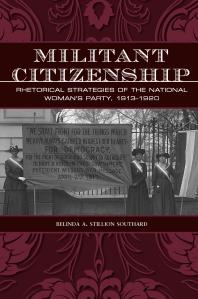

Most ebook files are in PDF format, so you can easily read them using various software such as Foxit Reader or directly on the Google Chrome browser.
Some ebook files are released by publishers in other formats such as .awz, .mobi, .epub, .fb2, etc. You may need to install specific software to read these formats on mobile/PC, such as Calibre.
Please read the tutorial at this link. https://ebooknice.com/page/post?id=faq
We offer FREE conversion to the popular formats you request; however, this may take some time. Therefore, right after payment, please email us, and we will try to provide the service as quickly as possible.
For some exceptional file formats or broken links (if any), please refrain from opening any disputes. Instead, email us first, and we will try to assist within a maximum of 6 hours.
EbookNice Team

Status:
Available4.3
22 reviews
ISBN 10: 1603446792
ISBN 13: 978-1603446792
Author: Belinda A. Stillion Southard
Between 1913 and 1920, the National Woman’s Party (NWP) waged a campaign to write women’s voting rights into the U.S. Constitution. Unlike the more moderate campaign strategies adopted by other woman suffrage organizations of the Progressive Era, the NWP remained committed to militant agitation—that is, holding political party leaders responsible for social change and doing so through nontraditional means of protest. Some of these militant strategies included heckling President Wilson, protesting silently outside the White House gates, and publicly burning his speeches in “Watch Fires.”Such militancy resulted in institutional acts of social control including censorship, arrests, beatings, and force-feedings. And yet, by the end of the woman suffrage movement, the NWP had earned the endorsements of every major political party, as well as of prominent politicians (including Wilson), and had found its name splashed across the front pages of the New York Times, the Washington Post, and the Chicago Tribune. One Times article even referred to the NWP as the “suffrage leaders.” Exploring the ways in which the militant NWP negotiated institutional opposition and secured such a prominent position in national politics drives the analysis offered in this manuscript.In light of the NWP’s militant identity and its demonstrated political viability, Belinda A. Stillion Southard treats the party’s campaign for woman suffrage as an example of how a relatively powerless group of women constituted themselves as “national citizens” through rhetoric. To this end, she uses volumes of NWP discourse, including correspondence, photographs, protests, and publications, to situate the NWP in the historical and ideological forces of the period, particularly as they are inflected by meanings of nationalism, citizenship, and social activism. In addition to this project’s historical focus, this study features the critical concept of political mimesis to help explain the ways in which the NWP mimicked political rhetorics and rituals to simultaneously agitate and accommodate members of the political elite.Taking root in Aristotle’s notion of mimesis as the process of representation and drawing upon more postmodern theories that link mimesis to identity-formation, this study demonstrates that the NWP’s mimetic strategies took multiple forms, including parody and appropriation. Through the rhetoric of political mimesis, the NWP militantly inserted itself into U.S. politics while it also earned the political legitimacy needed to assert women’s citizenship rights. Ultimately, the strength of political mimesis as a strategy of social change was demonstrated by the ways in which the NWP’s rhetoric circulated within national and international political discourse and solicited a response from political leaders, the U.S. news media, and NWP supporters.
Cover
Frontmatter
Acknowledgments
Introduction: The Making of Militants
Women, Citizenship, and US Nationalism
Mimesis and Political Ritual: The National Woman Suffrage Parade
Mimesis and Third-Party Politics: The Woman’s Party
Mimesis and the Rhetorical Presidency: The Silent Sentinels
Mimesis and US Internationalism: Statue Protests and the “Watch Fires of Freedom”
Afterword: “Suffrage Leaders”
Abbreviations
Notes
Bibliography
Index
citizenship in a republic rhetorical analysis
militant resistance
citizen rhetorical
rhetoric citizenship
rhetorical citizenship
Tags: Belinda Stillion Southard, Militant Citizenship, Rhetorical Strategies, National Woman